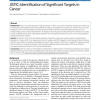Free Online Productivity Tools
i2Speak
i2Symbol
i2OCR
iTex2Img
iWeb2Print
iWeb2Shot
i2Type
iPdf2Split
iPdf2Merge
i2Bopomofo
i2Arabic
i2Style
i2Image
i2PDF
iLatex2Rtf
Sci2ools
114
click to vote
BMCBI
2010
2010
JISTIC: Identification of Significant Targets in Cancer
Background: Cancer is caused through a multistep process, in which a succession of genetic changes, each conferring a competitive advantage for growth and proliferation, leads to the progressive conversion of normal human cells into malignant cancer cells. Interrogation of cancer genomes holds the promise of understanding this process, thus revolutionizing cancer research and treatment. As datasets measuring copy number aberrations in tumors accumulate, a major challenge has become to distinguish between those mutations that drive the cancer versus those passenger mutations that have no effect. Results: We present JISTIC, a tool for analyzing datasets of genome-wide copy number variation to identify driver aberrations in cancer. JISTIC is an improvement over the widely used GISTIC algorithm. We compared the performance of JISTIC versus GISTIC on a dataset of glioblastoma copy number variation, JISTIC finds 173 significant regions, whereas GISTIC only finds 103 significant regions. Imp...
Related Content
| Added | 08 Dec 2010 |
| Updated | 08 Dec 2010 |
| Type | Journal |
| Year | 2010 |
| Where | BMCBI |
| Authors | Felix Sanchez-Garcia, Uri David Akavia, Eyal Mozes, Dana Pe'er |
Comments (0)

